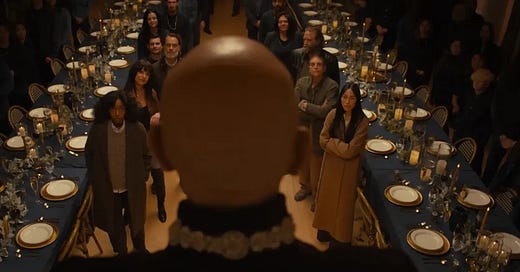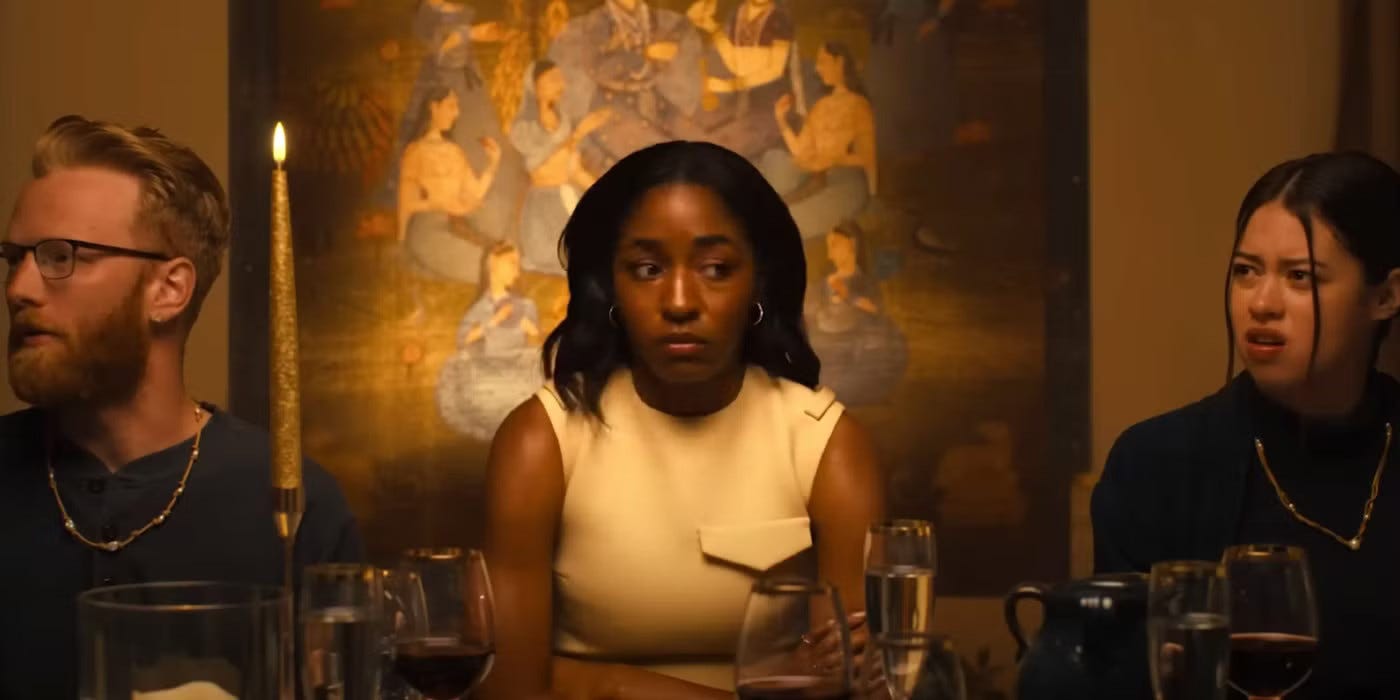There has to be an easier way for an aging, megalomaniacal glam rocker to kick-start his crackpot cult. If there is, OPUS hasn’t found it. The musician in question is Alfred Moretti (John Malkovich), a universally acclaimed artist whose songs once transformed the world (at least that’s what everyone in the film declares – the music doesn’t quite prove out the assertion. It’s good music, don’t get me wrong – done by Nile Rodgers and The-Dream – but Lennon/McCartney/Wonder/Mitchell/Prince/et al have nothing to worry about). Moretti retreated from the public eye decades ago, but is back now with a new album. To commemorate the release, he’s invited six journalists to his isolated, desert-bound compound – more like a small city, actually – for a preview. And if you’ve seen MIDSOMMER or THE MENU, you know where this is going.
Did I say six journalists? I meant five journalists and one aspiring journalist, Ariel (Ayo Edebiri). She’s tagging along with Stan (Murray Bartlett), her asshole... editor, I think... who treats her like his stenographer and ignores her trepidations about what’s going on at Morettiville. In contrast, Moretti takes a shine to the young woman, offering to give her a peek behind the veil of his community, an assemblage of artists and artisans devoted to a philosophy called Levelism, which advances the idea that creators are the rightful leaders of humanity. (Levelism is an actual word, btw, although its definition – “Disposition or endeavor to level distinctions of rank,” according to Merriam-Webster – seems to run counter to what’s portrayed here.)
It's obvious that OPUS wants to say something about artists, how they see themselves, and how they are perceived by the world. That pretty much gets shunted to a “twist” ending though, with the rest of the runtime being devoted to a slow reveal of how this community of creators isn’t as benign as it first appears. Which would be okay if the director, Mark Anthony Green, had any idea how to stage a gradual descent into hell. There is an inelegance to how he orchestrates his horror that’s unusual for an A24 release – one murder is so poorly ADR’d that I thought the wrong soundtrack had been cut in, while a poisoned woman’s choking death gets an unintentionally comic treatment (how many close-ups of a person with a tongue swelled up to the size of a large plum do you wish to see? If your answer is less than four, you’re not going to be pleased).
Green isn’t much better at his subtext. If there’s some kind of ironic point to the way the victims are dispatched, I couldn’t divine it; there’s a metaphor about oysters and pearls that doesn’t quite work; and we get a puppet show in which Billie Holiday is assaulted by a clutch of reporters modeled as rats – because GET IT? OPUS is essentially a reworking of the Vincent Price murder spree THEATER OF BLOOD, but without the wild panache, save maybe for Malkovich, who makes a field day of his role. I never for a minute bought him as a one-time glam rocker, but it appears he’s having fun, so good for him. For all that, Moretti isn’t much of a monster; compared to THE MENU’s mad master chef and his mixture of ego, contempt, and self-loathing, there isn’t much in Moretti for the audience to invest in, much less empathize with.
We may be getting to the point where A24 is beginning to eat its own tail. The distributor has offered many legitimately visionary films, but also a bunch of films that present as visionary – the better to court an upscale audience – but that genre fans know are just recyclings of scenarios we’ve encountered in less classy wrappings. OPUS not only treads a path that A24 has journeyed before, but without the finesse that would make it at least an entertaining experience. It wants to say something about the value of artistry, but fails at its own art.





